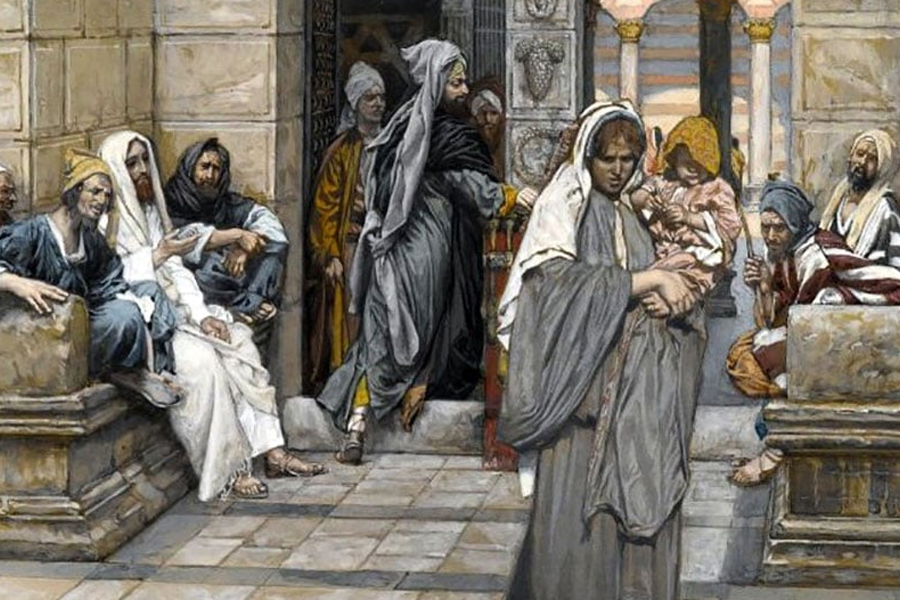St. Francis of Assisi Weekly Reflections

Love for Our Family
12-25-2021Weekly ReflectionWe Celebrate Worship Resource, Vol. 47, No. 1What makes a family a family? Is it not the love they have for each other? Ideally, that love is a selfless love, a willingness to put other family members’ needs before your own. This kind of love is modeled in today’s readings. Jesus—the perfect example of self -sacrificing love—demonstrates this love in today’s Gospel passage. He remains in his “Father’s house” for three days, a sign of his love for his divine family. He remained obedient to his parents, demonstrating his selfless love for his human family. Sirach speaks of caring for an elderly parent in a way as appropriate now as it was then: “Even if his mind fails, be considerate of him” (3:13). Hannah, who had been childless for years, selflessly offers her long-awaited child to the Lord. Paul asks us to “put on” a host or selfless qualities: “heartfelt compassion, kindness, humility, gentleness, and patience” (Colossians 3:12), and John reminds us that our love for one another is always familial, for we are all children of God. It is that selfless love, that love for a family member whose needs we put above our own, that is truly, as Paul wrote, “ the bond of perfection” (3:14).
How can you show self-sacrificing love to a family member this week? Can you show that love to others in our human family as well?
Amor por Nuestra Familia
Qué hace que una familia sea una familia? ¿No es el amor que setienen el uno al otro? Idealmente, ese amor es un amor desinteresado, la voluntad de anteponer las necesidades de otros miembros de la familia a las tuyas. Este tipo de amor está modelado en las lecturas de hoy. Jesús, el ejemplo perfecto de amor abnegado, demuestra este amor en el pasaje del Evangelio de hoy. Permanece en su “casa del Padre” durante tres días, signo suyo para su familia divina. Se mantuvo obediente a sus padres, demostrando su amor desinteresado por su familia humana. Eclesiástico habla de cuidar a un padre anciano de una manera tan apropiada ahora como entonces: “Aunque chochee, ten paciencia con él” (3:13). Ana, que no había tenido hijos durante años, ofrece desinteresadamente su hijo tan esperado al Señor. Pablo nos pide que nos “pongamos” cualidades desinteresadas: “sean compasivos, magnánimos, humildes, afables y pacientes” (Colosenses 3:12), y Juan nos recuerda que nuestro amor mutuo es siempre familiar, porque nosotros todos somos hijos de Dios. Es ese amor desinteresado, ese amor por un miembro de la familia cuyas necesidades anteponemos a las nuestras, que es verdaderamente, como escribió Pablo, “el vínculo de perfección” (3:14).
¿Cómo puedes mostrar amor abnegado a un miembro de tu familia esta semana? ¿Puedes mostrarle ese mismo amor a otros miembros de nuestra familia humana también?

Blessed is the Fruit of Your Womb
12-19-2021Weekly ReflectionWe Celebrate Worship Resource, Vol. 47, No. 1We have heard the story of Mary's visit to her cousin Elizabeth, two pregnant women blessed with child and filled with joy, countless times. But have we noticed who else was present when they met? “Elizabeth, filled with the Holy Spirit...” (Luke 1:41). Jesus was conceived in Mary’s womb by the Holy Spirit. The Holy Spirit was present in Mary, and when she greeted Elizabeth, the Holy Spirit filled her as well. Baptized in Christ, the Holy Spirit fills us as well, flowing freely from us and through us as we live our lives. Herself suddenly filled with the Holy Spirit, Elizabeth cries out, “Blessed are you among women, and blessed is the fruit of your womb” (1:42). She goes on to say, “Blessed are you who believed...” (1:45). The only time in Luke’s Gospel—or any of the other Gospels—in which the word “blessed” is used more often is in the Beatitudes. Years before Jesus gives his, Elizabeth showers the Blessed Virgin Mary with hers, honoring her cousin and anticipating God’s blessings upon the poor and lowly.
How do you bless those you meet?
Bendito el Fruto de tu Vientre
DEmos escuchado la historia de la visita de María a su prima Isabel, dos mujeres embarazadas bendecidas y llenas de alegría, innumerables veces. Pero, ¿hemos notado quién más estaba presente cuando se conocieron? “Isabel, llena del Espíritu Santo...” (Lucas 1:41). Jesús fue concebido en el vientre de María por el Espíritu Santo. El Espíritu Santo estaba presente en María, y cuando saludó a Isabel, el Espíritu Santo también la llenó. Bautizados en Cristo, el Espíritu Santo también nos llena, fluyendo libremente de nosotros y a través de nosotros mientras vivimos nuestras vidas. Ella misma llena de repente del Espíritu Santo, Isabel clama: “Bendita tú entre todas las mujeres, y bendito el fruto de tu vientre” (1:42). Ella continúa diciendo: “Dichosa tú que has creído...” (1:45). El único momento en el Evangelio de Lucas, o en cualquiera de los otros Evangelios, en el que la palabra “bendito” se usa con más frecuencia es en las Bienaventuranzas. Años antes de que Jesús le dé la suya, Isabel derrama a la Santísima Virgen María con la suya, honrando a su prima y anticipando las bendiciones de Dios sobre los pobres y humildes.
¿Cómo bendices a tu prójimo?
Obedience to God's Will
12-19-2021Question of the WeekReading I: Micah 5:1-4a -Restoration through the messiah
Reading II: Hebrews 10:5-10 - The second covenant
Gospel: Luke 1:39-45 - The visit to Elizabeth
Key Passage:
Elizabeth said,"Blessed is she who believed that there would be a fulfillment of what was spoken to her by the Lord.” (Luke 1:45)
Adults: When was it hardest for you to trust in God's plan for you, as Mary did? What can help you at such times?
Kids: When is it hardest for you to obey a parent or teacher? What can help you obey with more trust?
Obediencia a la Voluntad de Dios
Lectura I: Miqueas 5: 1-4a -Restauración a través del mesías
Lectura II: Hebreos 10: 5-10 -Evangelio del segundo pacto
Evangelio: Lucas 1: 39-45 - La visita a Isabel
Pasaje Clave
Isbel dijo: "Dichosa tú, que has creído, porque se cumplirá cuanto te fue anunciado de parte del Señor.” (Lucas 1:45)
Adultos: ¿Cuándo se te hizo más difícil confiar en el plan de Dios para ti, como lo hizo María? ¿Qué te puede ayudar en esos momentos?
Niños: ¿Cuándo es más difícil para ti obedecer a un padre o maestro? ¿Qué te puede ayudar a obedecer con más confianza?

Wheat of the World
12-12-2021Weekly ReflectionWe Celebrate Worship Resource, Vol. 47, No. 1You wouldn't know it from his words, but Zephaniah preached during a very difficult time. God’s Chosen People had turned away from the Lord, influenced by the legacy of a corrupt king (Manasseh) and compromised by Assyrian rule. Yet he wrote, “Shout for joy!” “Be glad and exult!” (3:14). How could he say this? He believed that the people would change, for God was in their midst, ready to save them. John the Baptist came upon the scene at another difficult time. Once again, the Jewish people lived under foreign rule. Many had dishonored themselves by working for the occupying force. John called them to change. Tax collectors: Collect only what is fair. Soldiers: Stop extorting people. Everyone: Share what you have with those who don’t. God is in your midst, ready to save you, for the Messiah comes. Rejoice! Even in the darkest of times God is in our midst as well, ready to enter our hearts, ready to save us. Let us change how we live, becoming wheat for the world, giving sustenance to our neighbor as we look to be gathered into God’s kingdom.
What can you do to be “wheat of the world,” to be sustenance for your neighbor?
Trigo del Mundo
No lo sabías por sus palabras, pero Sofonías predicó durante un momento muy difícil. El Pueblo Elegido de Dios se había apartado del Señor, influenciado por el legado de un rey corrupto (Manasés) y comprometido por el gobierno asirio. Sin embargo, escribió: “¡Canta, da gritos de júbilo!” “¡Gózate y regocíjate!” (3:14). ¿Cómo pudo decir esto? cambiaría, porque Dios estaba en medio de Creía que la gente ellos, listo para salvarlos. Juan el Bautista apareció en escena en otro momento difícil. Una vez más, el pueblo judío vivió bajo un dominio extranjero. Muchos se habían deshonrado a sí mismos trabajando para la fuerza de ocupación. Juan los llamó para que se cambiaran. Recaudadores de impuestos: recauden solo lo justo. Soldados: Dejen de extorsionar a la gente. Todos: compartan lo que tiene con los que no tienen. Dios está en medio de ustedes, listo para salvarlos, porque viene el Mesías. ¡Alégrense! Incluso en los tiempos más oscuros, Dios también está entre nosotros, listo para entrar en nuestros corazones, listo para salvarnos. Cambiemos la forma en que vivimos, convirtiéndonos en trigo para el mundo, dando sustento a nuestro prójimo mientras esperamos ser recogidos en el reino de Dios.
¿Qué puedes hacer para ser “trigo del mundo”, para ser sustento para tu prójimo?

Repent your Sins
12-05-2021Weekly ReflectionWe Celebrate Worship Resource, Vol. 47, No. 1Envisioning an eventual return of the exiles to Jerusalem, Isaiah painted a beautiful image of mountains being made low, roads being made straight, and rough ways being made smooth. The vision was so powerful that centuries later Baruch echoed those words when describing the Jewish people’s return home from the Diaspora. Even more generations had passed when all four evangelists chose to quote Isaiah’s original words to describe John the Baptist’s exhortation to repent. Their sins were the mountain and hills that needed to be made low, impending their ability to follow the Lord. Likewise, our sins are obstacles on the path, perhaps a recent “mountain (to) be made low,” often “age-old depths and gorges (to) be filled to level ground” (Baruch 5:7). This Advent let John the Baptist guide us as well. Let us make smooth our path to the Lord through repentance, regretting our sins and atoning for the hurt we have caused. Good work was begun in us in baptism. During this holy season let us show that good work, preparing ourselves for our encounter with Christ, whenever and however he comes.
What specifically can you do to repent for your sins, which create obstacles on your path to follow the Lord?
Arrepenpientete de tus Pecados
Al imaginar un eventual regreso de los exiliados a Jerusalén, Isaías pintó una hermosa imagen de montañas que se rebajaron, y caminos que se enderezaron y caminos ásperos que se allanaron. La visión fue tan poderosa que siglos después Baruc hizo eco de esas palabras al describir el regreso del pueblo judío a casa desde la Diáspora. Habían pasado aún más generaciones cuando los cuatro evangelistas optaron por citar las palabras originales de Isaías para describir la exhortación de Juan el Bautista al arrepentimiento. Sus pecados eran la montaña y las colinas que necesitaban ser abatidas, lo que impedía su capacidad para seguir al Señor. Asimismo, nuestros pecados son obstáculos en el camino, tal vez una reciente “montaña para abajar”, a menudo “se rellenen todos los valles hasta aplanar la tierra” (Baruc 5:7). Este Adviento dejó que Juan el Bautista nos guiara también. Alisemos nuestro camino hacia el Señor a través del arrepentimiento, lamentándonos de nuestros pecados y expiando el daño que hemos causado. La buena obra se inició en nosotros en el bautismo. Durante este tiempo santo demostremos esa buena obra, preparándonos para nuestro encuentro con Cristo, cuando y como venga.
¿Qué puedes hacer específicamente para arrepentirte de tus pecados, especialmente esos que crean obstáculos en tu camino para seguir al Señor?

How Will You Prepare?
11-28-2021Weekly ReflectionWe Celebrate Worship Vol. 46, No. 3Today's Gospel may come as a shock on this first Sunday of Advent. “People will die of fright in anticipation of what is coming” (Luke 21:26). “For that day will assault everyone who lives on the face of the earth” (21:35). Wow. You won’t be reading those words in any Christmas cards you get this year! Today’s Gospel is not about the birth of Jesus at all; no, it is about his second coming to judge humankind at the end of time. This is what Jesus warns his disciples about. It is certainly much more pleasant to look back at his first coming as a beautiful baby than to look forward to his second coming as the ultimate judge. But we know that in between these two occasions are an infinite number of moments when Jesus comes into the world. Sometimes heartwarming, sometimes terrifying, often traumatic, our Savior continually waits to be born into our ordinary lives. Let us pray that we are prepared to welcome him however it may happen—in a manger, in an earthquake, or in some other way we least expect.
What will you do to prepare your self to welcome the Lord at any time?
¿Qué harás para Prepararte?
El evangelio de hoy puede sorrendernos en este primer domingo de Adviento. "La gente se morirá de terror por las cosas que vendrán sobre el mundo” (Lucas 21:26). “Porque caerá de repente como una trampa sobre todos los habitantes de la tierra” (21:35). Guau. ¡No leerás esas palabras en ninguna de las tarjetas de Navidad que recibas este año! El evangelio de hoy no trata en absoluto del nacimiento de Jesús; no, se trata de su segunda venida para juzgar a la humanidad al final de los tiempos. Esto es sobre lo que Jesús advierte a sus discípulos. Ciertamente es mucho más agradable recordar su primera venida como un hermoso bebé que esperar su segunda venida como el juez supremo. Pero sabemos que entre estas dos ocasiones hay un número infinito de momentos en los que Jesús viene al mundo. A veces conmovedor, a veces aterrador, a menudo traumático, nuestro Salvador espera continuamente nacer en nuestra vida cotidiana. Oremos para que estemos preparados para darle la bienvenida sin importar lo que suceda: en un pesebre, en un terremoto o de alguna otra manera que menos esperemos.
¿Qué harás para prepararte para recibir al Señor en cualquier momento?

How Do You Listen to the Lord's Voice?
11-21-2021Weekly ReflectionWe Celebrate Worship Vol. 46, No. 3We have quite a bit about the kingdom of God over the last few weeks. Recall that Jesus assured the sincere questioner that he was “not far from the kingdom of God” (Mark 12:34). On the solemnity of All Saints, we heard Jesus teach that the poor in spirit and the unjustly persecuted would inherit the kingdom of God. (Matthew uses the synonymous term “kingdom of heaven.”) Today we hear Jesus refer to the kingdom when questioned by Pilate. Later, as always, we will pray the Lord’s Prayer, praying that God’s kingdom will come. When Jesus spoke in parables, he often did it to describe the kingdom of God. The kingdom of God is the culmination of Jesus’ life here on earth and the goal of each of ours. Daniel envisioned the kingdom when he spoke of the Son of Man’s everlasting dominion. The author of Revelation attests that Jesus Christ has made us into a kingdom. The kingdom of God is in our grasp as long as Jesus reigns in our lives, guiding us to the truth, guiding us to himself.
How do you listen to the Lord’s voice? How have you testified to the truth?
¿Cómo escuchas la voz del Señor?
Hemos escuchado bastante sobre el reino de Dios durante las últimas semanas. Recuerda qu Jesús le aseguró al sincero interrogador que él “no está lejos del reino de Dios” (Marcos 12:34). En la solemnidad de Todos los Santos, escuchamos a Jesús enseñar que los pobres de espíritu y los perseguidos injustamente heredarían el reino de Dios. (Mateo usa el término sinónimo “reino de los cielos”). Hoy escuchamos a Jesús referirse al reino cuando Pilato lo interroga. Más tarde, como siempre, rezaremos el Padrenuestro, orando para que venga el reino de Dios. Cuando Jesús hablaba en parábolas, a menudo lo hacía para describir el reino de Dios. El reino de Dios es la culminación de la vida de Jesús aquí en la tierra y la meta de cada uno de los nuestros. Daniel imaginó el reino cuando habló del dominio eterno del Hijo del Hombre. El autor de Apocalipsis da fe de que Jesucristo nos ha convertido en un reino. El reino de Dios está a nuestro alcance mientras Jesús reine en nuestras vidas, guiándonos a la verdad, guiándonos hacia Él.
¿Cómo escuchas la voz del Señor? ¿Cómo has testificado de la verdad?

We Shall Be Like Stars Forever
11-14-2021Weekly ReflectionWe Celebrate Worship Vol. 46, No. 3Every year around this time we hear scriptural passages with terrifying images of the end of the world: “A time unsurpassed in distress,” “the sun will be darkened,” “the stars will be falling from the sky” (Daniel 12:1; Mark 13:24, 25). These days, whenever a number of terrible things happen around the same time, we joke that the world is coming to an end. But it was not a joke to those who first heard the words we hear today. Daniel and Mark wrote during times of great persecution for Jewish people, and then for Christian people as well. But they did not write just to terrify their audience. They also wrote to comfort their listeners, to give hope during times of persecution. Though terrible things will happen, those in God’s favor will be rescued. “Your people shall escape,” “some shall live forever,” the Son of Man... (will) gather his elect from the four winds” (Daniel 12:1, 2; Mark 13:26-27). In every era, it is worth being reminded that one day life on earth will come to an end. It might be soon; it might be thousands of generations from now. As Jesus told his disciples, we cannot know. But while we live, we strive to lead others in God’s right paths, so that we “shall be like the stars forever” (Daniel 12:3).
How have you led others to justice? How will you do so in the future?
Seremos como las Estrellas a por siempre
Cada año, para esta época, escuchamos pasajes de las Escrituras con imágenes aterradoras del fin del mundo: “Un tiempo de angustia sin igual”, “el sol se oscurecerá”, “las estrellas caerán del cielo” (Daniel 12:1; Marcos 13:24, 25). En estos días, cada vez que suceden una serie de cosas terribles al mismo tiempo, bromeamos diciendo que el mundo está llegando a su fin. Pero no fue una broma para quienes escucharon por primera vez las palabras que escuchamos hoy. Daniel y Marcos escribieron durante tiempos de gran persecución para el pueblo judío, y luego también para el pueblo cristiano. Pero no escribieron solo para aterrorizar a su audiencia. También escribieron para consolar a sus oyentes, para dar esperanza en tiempos de persecución. Aunque sucederán cosas terribles, los que estén a favor de Dios serán rescatados. “Se salvará tu pueblo”, “algunos para la vida eterna”, el Hijo del Hombre... (reunirá) a sus elegidos desde los cuatro puntos cardinales” (Daniel 12:1, 2; Marcos 13:26-27). En todas las épocas, vale la pena recordar que un día la vida en la tierra llegará a su fin. Podría ser pronto; podrían pasar miles de generaciones a partir de ahora. Como Jesús les dijo a sus discípulos, no podemos saber. Pero mientras vivimos, nos esforzamos por guiar a otros por los caminos rectos de Dios, para que “seamos como las estrellas por siempre” (Daniel 12:3).
¿Cómo has llevado a otros a la justicia? ¿Cómo lo harás en el futuro?
Ready for the Lord
11-14-2021Question of the WeekReading I: Daniel 12:1-3 -Daniel's Conclusion to the Apocalypse
Reading II: Hebrews 10:11-14, 18 -Christ's Eternal Sacrifice
Gospel: Mark 13:24-32 - The Second Coming
Key Passage:
Jesus said, “But of that day or hour, no one knows, neither the angels in heaven, nor the Son, but only the Father.” (Mark 13:32)
Adults: What would you be doing differently in your life if you truly believed you would meet Christ soon?
Kids: What would you do for others today if you thought you would not have another chance to do it?
Listo para el Señor
Lectura I: Daniel 12: 1-3 -Conclusión de Daniel al Apocalipsis
Lectura II: Hebreos 10: 11-14, 18 -El sacrificio eterno de Cristo
Evangelio: Marcos 13:24-32 -La Segunda Venida
Pasaje Clave:
Jesús dijo: “Nadie conoce el día ni la hora. ni los ángeles del cielo ni el Hijo; solamente el Padre”. (Marcos 13:32)
Adultos: ¿Qué harías de manera diferente en tu vida si realmente creyeras que encontraras a Cristo pronto?
Niños: ¿Qué harías hoy por los demás si pensaras que no tendrás otra oportunidad de hacerlo?
Dando Desde Nuestra Necesidad
11-07-2021Question of the WeekReading I: 1 Kings 17:10-16 —Elijah and the Widow
Reading II: Hebrews 9:24-28 - The Sacrifice of Jesus
Gospel: Mark 12:38-44 - Hypocrisy of the Scribes, and the Widow's Mite
Key Passage:
Jesus said,"Truely I tell you, this poor widow has put in more than all those who are contributing to the treasury. For all of them have contributed out of their abundance; but she out of her poverty has put in everything she had, all she had to live on.” (Mark 12:43–44)
Adults: What are you willing to give out of love for God that would be a hardship for you?
Kids: What would you be willing to give up for someone else?
Dando Desde Nuestra Necesidad
Lectura I: 1 Reyes 17: 10-16: Elías y la viuda
Lectura II: Hebreos 9: 24-28 - El sacrificio de Jesús
Evangelio: San Marcos 12: 38-44: Hipocresía de los escribas y ácaro de la viuda
Pasaje Clave
Jesús dijo: “Les aseguro que esta viuda pobre ha echado en el tesoro más que todos los demás. Estos dieron de lo que les sobraba; pero ella, de su pobreza, echó todo lo que tenía, todo su sustento.” (Marcos 12:43–44)
Adultos: ¿Qué estás dispuesto a dar por amor a Dios que sería una dificultad para ti?
Niños: ¿Qué estás dispuesto a dar por amor a Dios que sería una dificultad para ti?

She Gave All She Had
11-06-2021Weekly ReflectionWe Celebrate Worship Vol. 46, No. 3It's impossible to overtate how difficult life was for a widow in Jesus’ time or Elijah’s. When a woman married she left the protection of her father and family and became dependent on her husband. If he died first, she lost not only her husband but also her source of income, her economic security, and often whatever wealth her family had due to inheritance laws. When Jesus says that this widow “contributed all she had,” he was not exaggerating (Mark 12:44). Why, then, did she give her last penny to the temple treasury? For that matter, why did the widow on her deathbed give her last morsel of food to Elijah, this foreign stranger? These poor widows have sacrificed all they had, becoming absolutely dependent on God. They trusted that God would provide. God does provide, in fact through people like them, people whose generosity provides life to others. This is the lesson Jesus ultimately teaches from the cross. After having given up his (divine) privilege, his home, and all his worldly belongings, he gives his very life as the perfect example of his generosity and faith. As Hebrews says, he is dependent on God for life itself.
When have you given of yourself even when you had little to offer? How can you do so now?
Ella Dio Todo lo Que Tenía
Es imposible exagerar lo difícil que fue la vida para una viuda en la época de Jesús o de Elías. Cuando una mujer se casaba, dejaba la protección de su padre y su familia y se volvía dependiente de su marido. Si él moría primero, ella perdía no solo a su esposo, sino también su fuente de ingresos, su seguridad económica y, a menudo, la riqueza que tenía su familia debido a las leyes de herencia. Cuando Jesús dice que esta viuda “contribuyó con todo lo que tenía”, no estaba exagerando (Marcos 12:44). Entonces, ¿por qué dio su último centavo al tesoro del templo? De hecho, ¿por qué la viuda en su lecho de muerte le dio su último bocado de comida a Elías, este extraño extranjero? Estas pobres viudas han sacrificado todo lo que tenían, volviéndose absolutamente dependientes de Dios. Confiaron en que Dios proveería. Dios proporciona, de hecho, a través de personas como ellos, personas cuya generosidad da vida a los demás. Esta es la lección que Jesús finalmente enseña desde la cruz. Después de haber renunciado a su privilegio (divino), su hogar y todas sus pertenencias mundanas, da su misma vida como el ejemplo perfecto de su generosidad y fe. Como dice Hebreos, él depende de Dios para la vida misma.
¿Cuándo has dado de ti mismo incluso cuando tenías poco que ofrecer? ¿Cómo puedes hacerlo ahora?